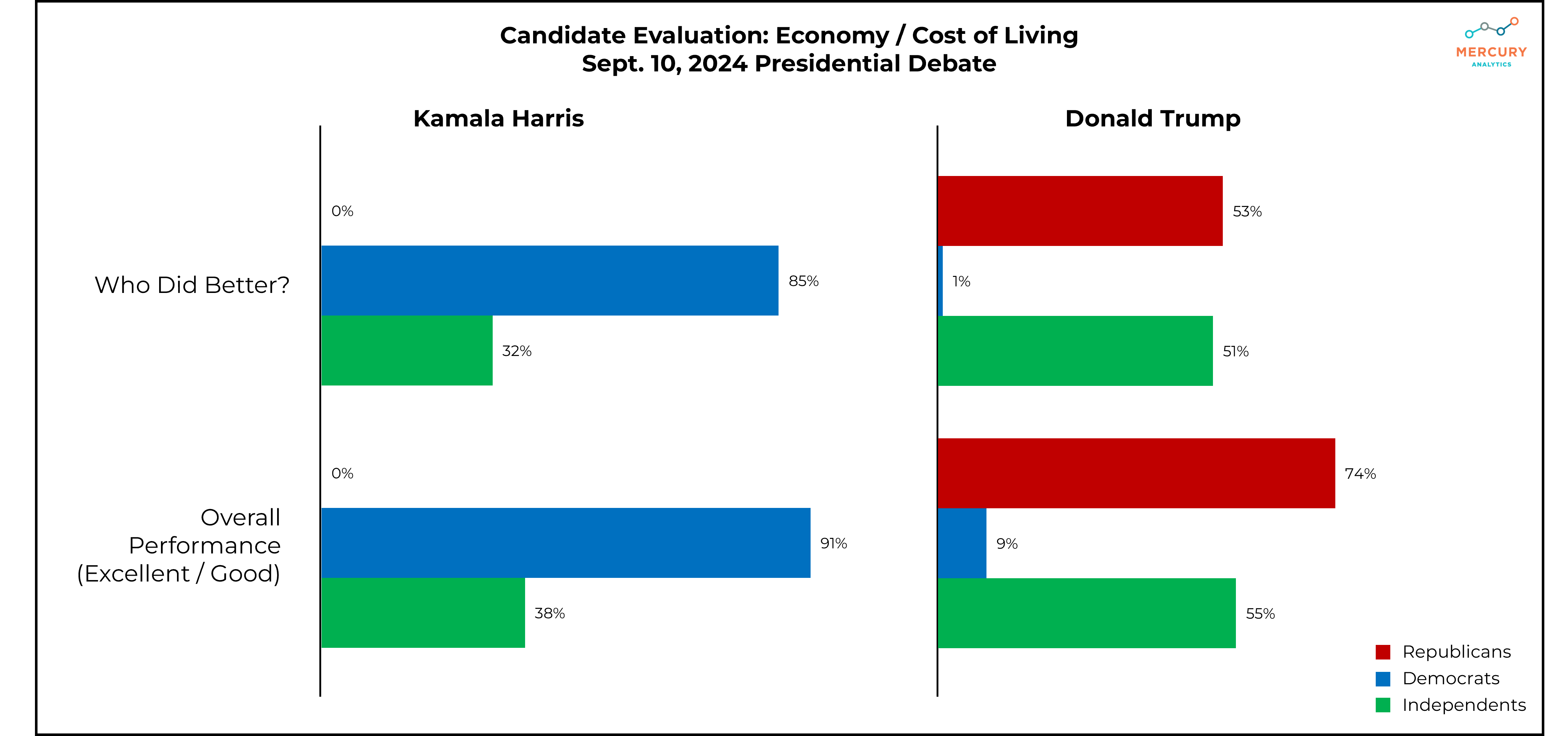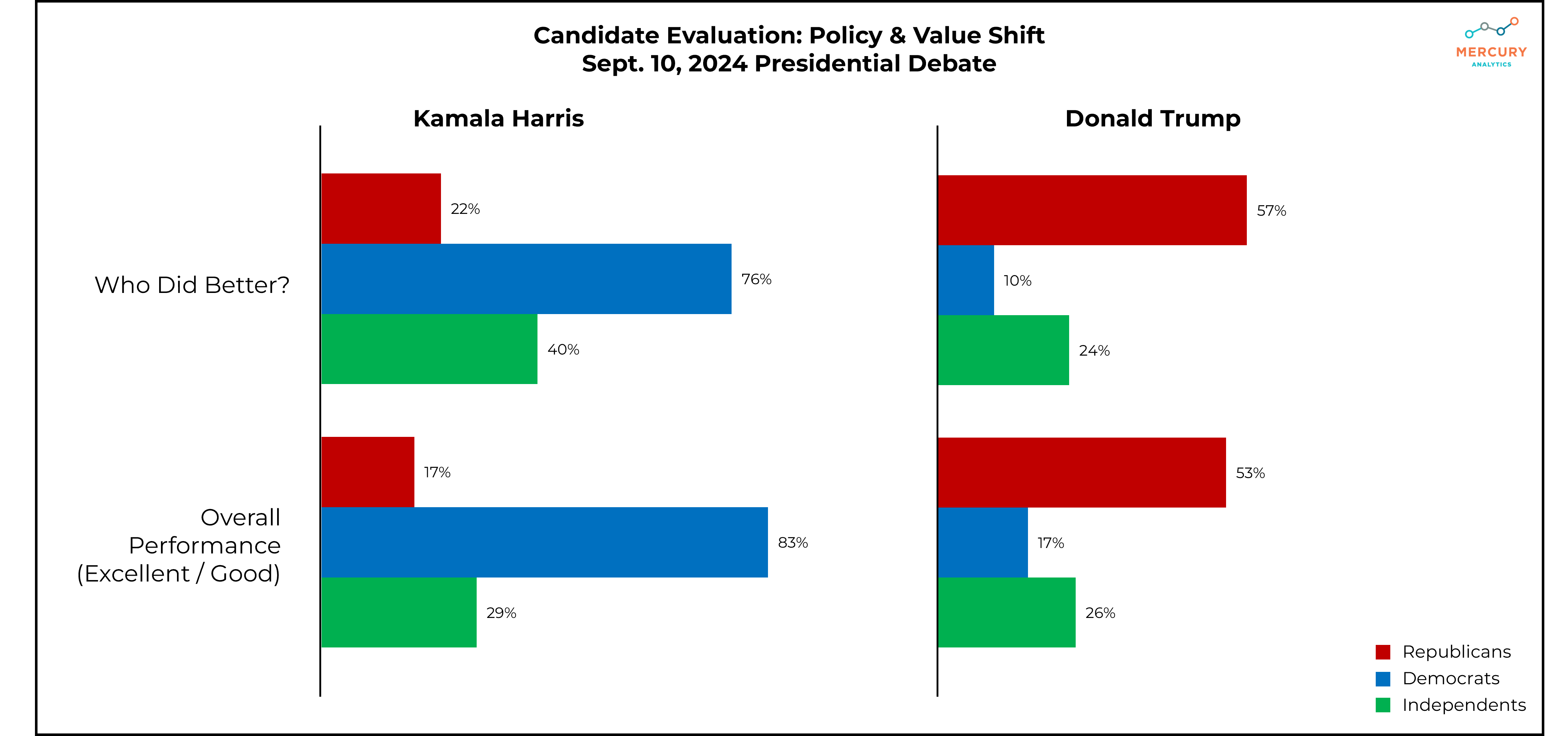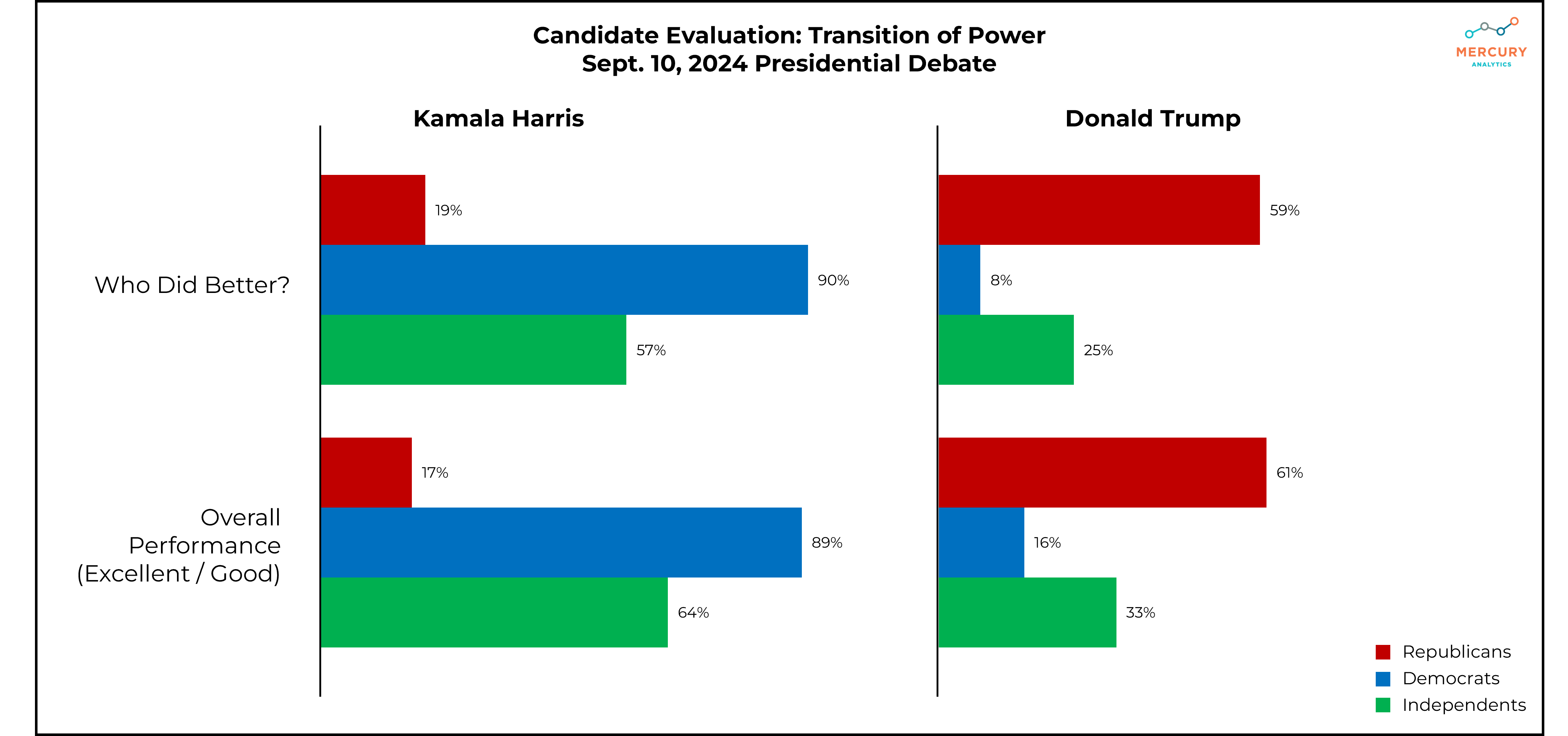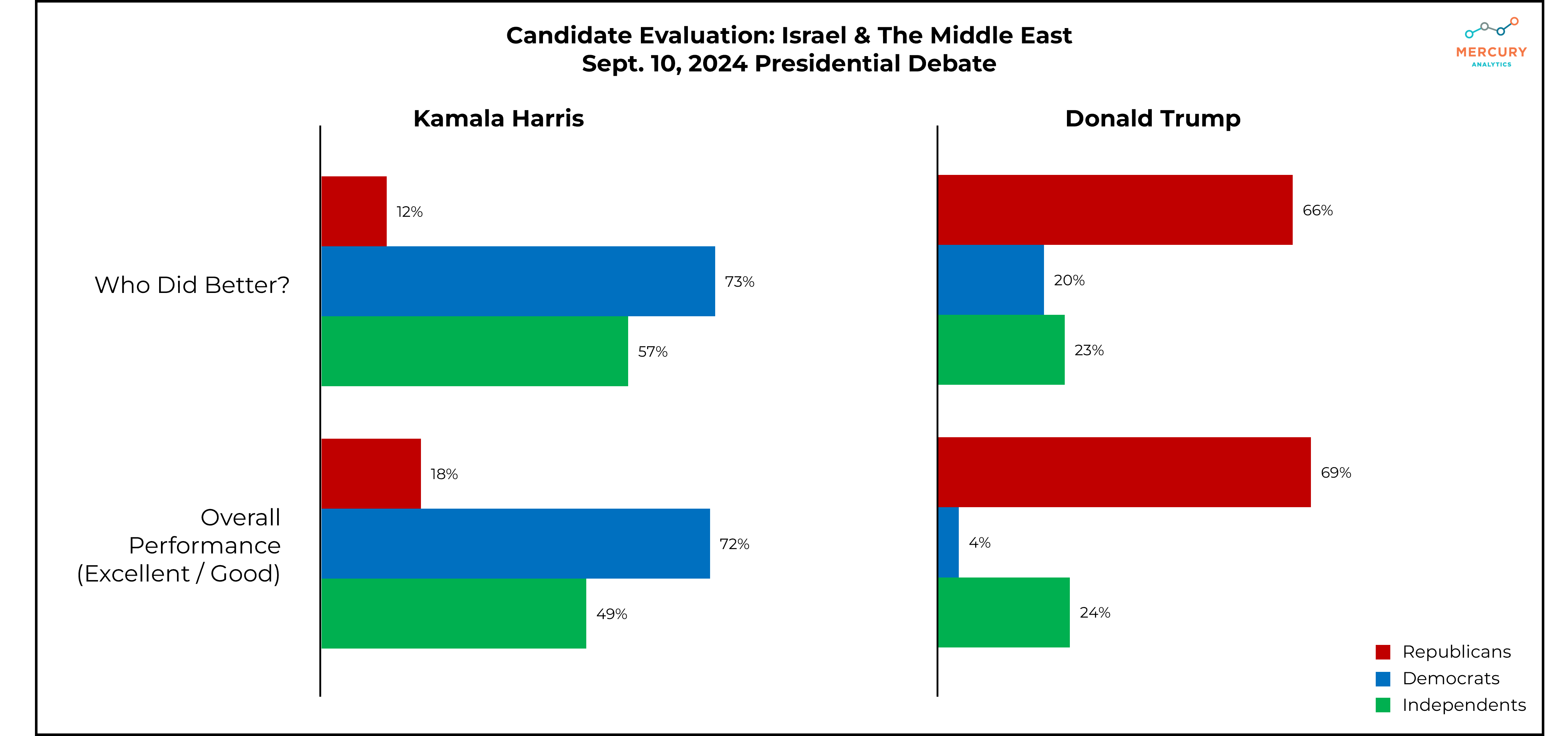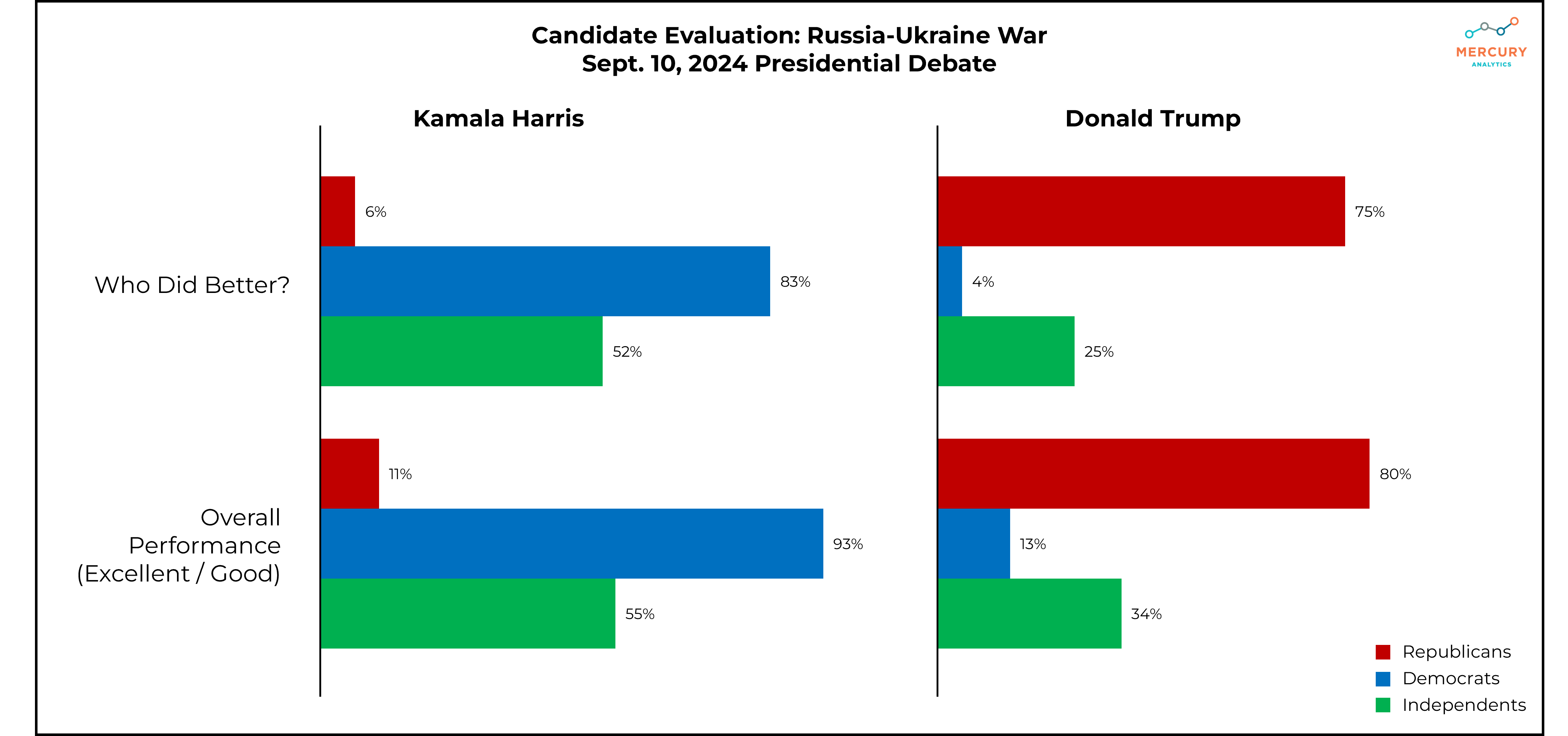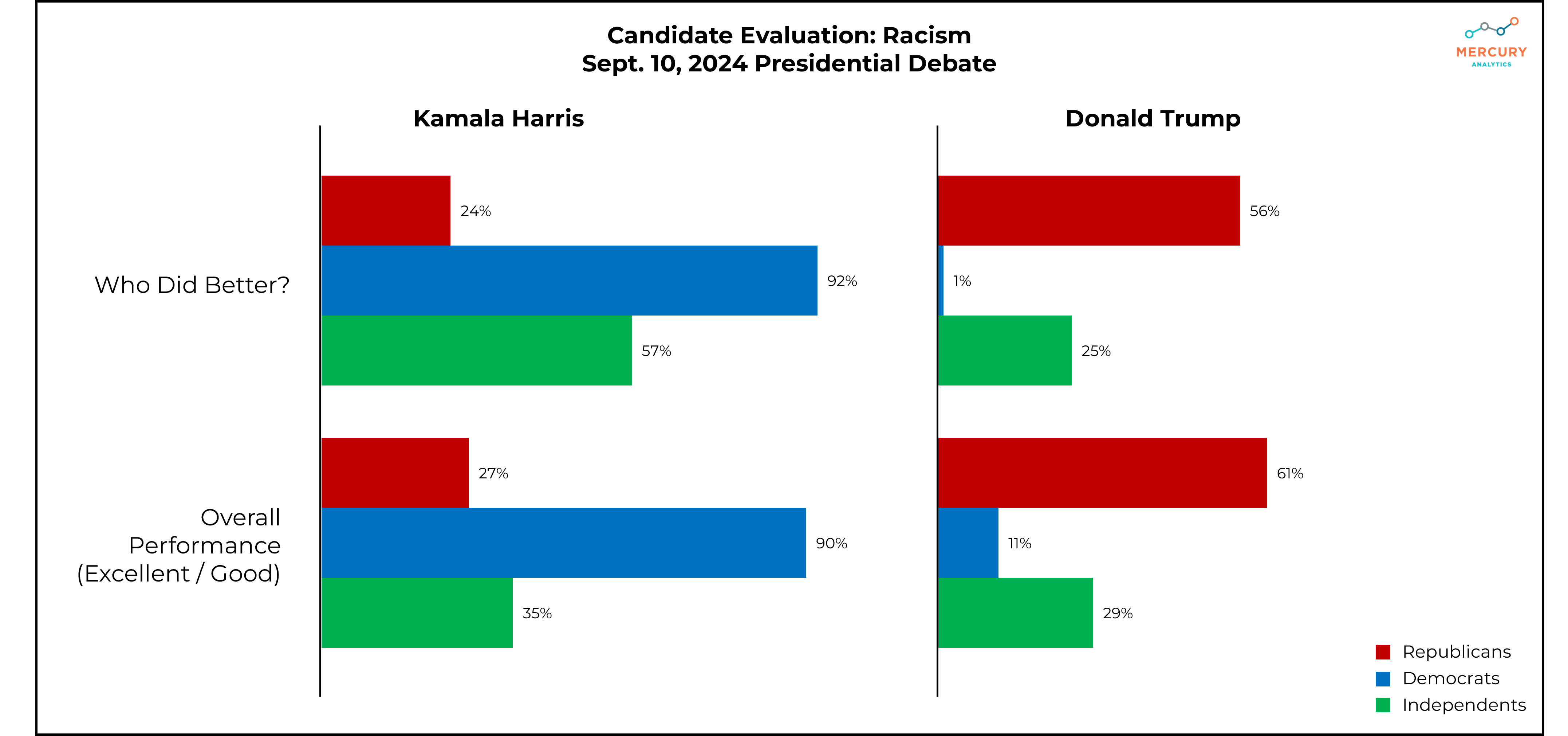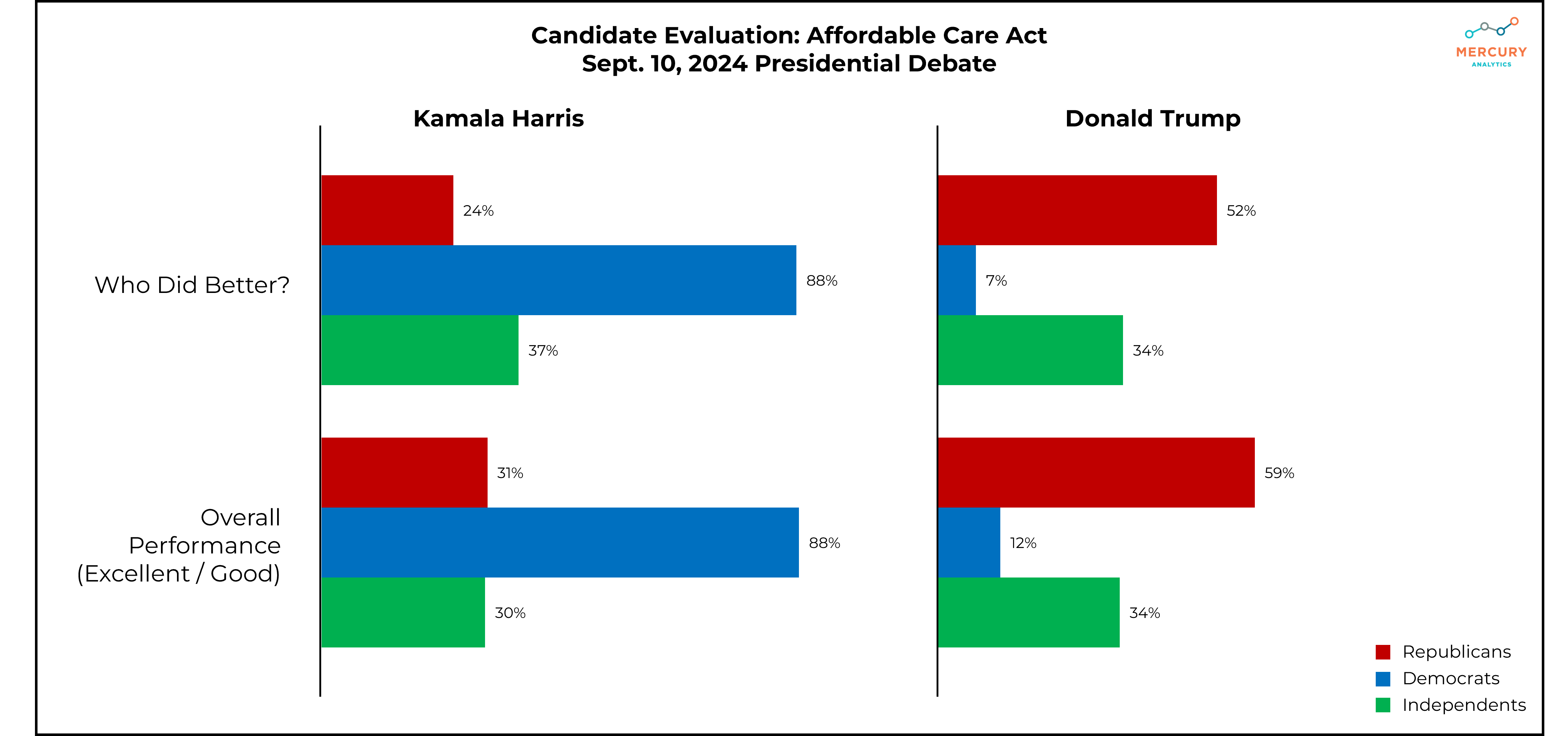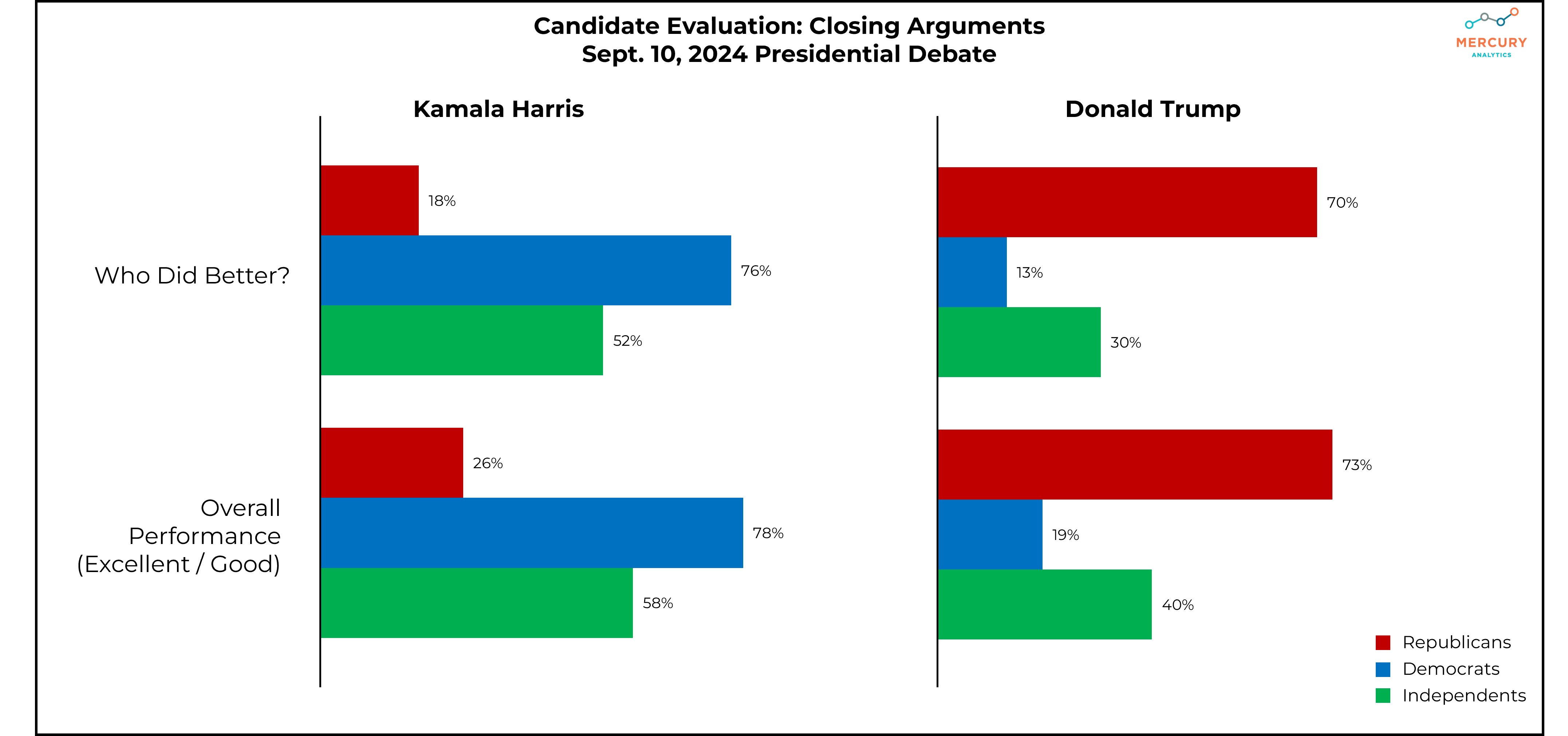2024 Presidential Debate:
Harris vs. Trump Dial Test
Overnight National Research Among n1064 Likely Voters
On September 10th, 2024, the first presidential debate between Vice President Kamala Harris and former President Donald Trump took place at the National Constitution Center in Philadelphia, PA.

THE SETTING
Mercury Analytics conducted an overnight survey including dial-tests of the presidential debate between Vice President Kamala Harris and former President Donald Trump, which took place on September 10th, 2024 at Philadelphia’s National Constitution Center. After President Joe Biden dropped out of the presidential race earlier this year and endorsed Vice President Kamala Harris as the Democratic nominee, this debate provided an opportunity for the two candidates to meet in an intimate setting for the first time, without an in-person audience.
This debate’s format followed similar rules to the June 2024 debate between President Joe Biden and former President Trump. The candidates forwent opening statements and began answering questions immediately, with 2 minutes allotted for responses, 2 minutes allotted for rebuttals, and 1 additional minute for follow-ups or clarifications. Candidates were not allowed to ask each other questions and their microphones were muted when not speaking. At the end, the candidates were given 2 minutes for brief closing statements. The debate also featured two commercial breaks (during which candidates were not allowed to interact with their staff) and the debate was not filmed in front of a live audience.
The debate started at 9:00 p.m. ET and consisted of 12 segments dedicated to various topics affecting the United States. ABC News’s David Muir and Linsey Davis moderated the presidential debate, and asked the candidates questions on the following topics: Economy, Abortion, Immigration, Fracking, Peaceful Transfer of Power, Israel & Hamas, Russia & Ukraine, Afghanistan, Race & Ethnicity, Healthcare, Climate Change, and Closing Statements.
Mercury’s study tested the candidates’ performance among a national sample of n=1258 likely voters. Respondents were first asked a series of demographic questions followed by questions to help understand respondents’ current views on politics in America, and specifically regarding Vice President Kamala Harris and former President Trump. Some respondents were directed to a quick poll gauging their reactions to the debate, while others participated in a dial test exercise in which they were shown short clips from the debate and asked to provide moment-to-moment reactions.
As participants watched the video, they moved a slider just below the video to the right the more strongly they agreed with what they were seeing and hearing, or to the left the more strongly they disagreed. Before the close of the survey, respondents were asked post-exposure questions to assess their reactions to both candidates’ performance in the debate, and data was analyzed with the assistance of MercuryAI.
MercuryAI is an OpenAI-powered research platform designed for rapid, in-depth analysis of quantitative and qualitative data, enabling users to quickly and easily produce a high-level topline summary with just a few clicks, or dive deeper into qualitative information to define key themes and takeaways.
Integrated into the Mercury Analytics Workbench, MercuryAI provides comprehensive insight into quantitative research, open-end verbatims, focus groups, and interviews or IDIs while maintaining data integrity and keeping proprietary information secure.
For more information on Mercury’s dial-testing or MercuryAI, click here, and for more technical information about the study, please contact Jordan Kraft or at 202-386-6322 x 322.
ANALYSIS OF REACTIONS TO DEBATE SEGMENTS
Fielded Among n1064 Likely Voters Who Watched and Dial-Tested a Debate Segment
Harris Scores on the Economy, But Trump’s Base Remains Loyal
Across party lines, the economy and cost of living emerge as a key issue, with Harris’s comments about the housing crisis striking a chord with voters. Surprisingly, even Republicans gave a notable spike in approval as she addressed housing and the workforce, an unusual boost for a Democratic candidate in a debate filled with partisan divisions. Democrats were highly receptive to Harris’s call for an expanded child tax credit, and Independents reacted strongly to both candidates discussing the importance of bringing people together.
However, Trump’s base remained steadfastly loyal when he spoke about inflation and America’s manufacturing industries, keeping Republican ratings high. While he occasionally alienated swing voters, especially with his controversial statements on other topics, his focus on jobs and economic strength allowed him to maintain strong Republican support.
Abortion Debate Showed Complexity Across Party Lines
The segment on abortion highlighted nuanced reactions across the spectrum, with Trump resonating even among some Democrats for insisting on exceptions to abortion bans, while Harris’s focus on personal freedoms around reproductive rights energized her base. Notably, Independent voters reacted most positively to Harris’s moral framing of the issue, particularly when she talked about the rights of crime survivors. Both candidates received backlash for moments of perceived extremism—Harris for raising fears about national abortion bans, and Trump for invoking inflammatory rhetoric about post-birth abortions.
Immigration and Crime a Double-Edged Sword for Trump
Trump’s familiar hardline stance on immigration, including his rhetoric on crime and the Justice Department, resonated deeply with Republicans. However, both Independents and Democrats were turned off by some of his more extreme claims, especially when he repeated debunked statements about immigrants eating pets, which caused disapproval even among his base. In contrast, Harris managed to win over more Independent voters by pivoting away from the heated immigration rhetoric and addressing broader concerns about housing and the economy.
Independents Reacted Favorably to Harris’s Vision of Unity
Harris’s overall message of unity and her call for the U.S. to “end the chaos” resonated strongly with Independents, especially during the debate’s closing moments. Her emphasis on forging a new, forward-looking path and protecting democracy struck a chord, helping her gain ground with this crucial voting bloc. In contrast, Trump’s refusal to acknowledge the results of the 2020 election and his frequent return to themes of division and grievance led to a significant drop in approval among Independents, even as Republicans continued to rally behind his claims.
The Debate’s Broader Implications
The September 10th debate provided a vivid illustration of the polarized state of American politics. While Harris struck a chord with key swing voters, especially on issues of unity, democracy, and the economy, Trump’s base remains loyal, showing little willingness to shift in the face of controversy. Moving forward, both candidates will need to adjust their messaging—Harris to consolidate Independent support, and Trump to regain favor with a broader electorate—if they hope to secure victory in November.
Economy / Cost of Living
PIVOTAL MOMENT — Respondents from all party affiliations sharply raise their ratings when Harris details the high cost of living in the United States, as Harris talks about the housing crisis. Republicans, notably, indicate an especially sharp increase in agreement as Harris says this.
REPUBLICANS — Despite consistent low ratings during Harris’s remarks in this segment, ratings among Republican voters spike early on when Harris first brings up the cost of housing. Republican ratings reach a smaller peak later on when Harris describes supporting American industries and the workforce. They remain consistently high when Trump is speaking.
DEMOCRATS — Ratings indicate agreement with Harris’s vision for the economy. They reach their peak early in this segment when Harris proposes an expanded child tax credit. Though generally trending towards “Disagree Strongly” when Trump speaks, Democrats reach a peak when Trump mentions inflation and the rising cost of goods. Immediately after this moment, however, as Trump shifts attention to immigration and its perceived negative consequences, Democrats’ ratings fall again and reach their lowest point for the entire segment.
INDEPENDENTS — Ratings among Independent voters reach their two highest peaks when the two candidates bring up the cost of living during their first respective statements during this segment. They also reach a smaller peak when Harris mentions the importance of the President bringing people together. Independent ratings hit their lowest point when Harris accuses Trump of selling out America by selling computer chips to China.
Abortion
PIVOTAL MOMENT — All parties indicate increased ratings as Trump insists upon exceptions for abortion restrictions and decreased ratings as Harris insists Trump would sign a national abortion ban.
REPUBLICANS — Trump’s initial framing of extreme Democrat abortion timelines, his insistence that the abortion ban presidential veto discussion is moot, and his claims about IVF resonate strongly with Republicans. Harris’s pro-choice pitch rooted in morality is also relatively well-received by Republicans.
DEMOCRATS — Indicating their interest in the human side of the issue, Democrat agreement rises to its high point when Harris emphasizes the freedoms at the center of this debate, and they agree more than usual with Trump when he insists on certain exceptions.
INDEPENDENTS — Ratings rise fastest and to their highest point after Harris says “a survivor of a crime of violation to their body, does not have the right to make the decision about what happens to their body next. That is immoral.” However, they dislike fear-mongering, such as Harris’s warning about Project 2025 pregnancy monitors and Trump’s claims about post-birth abortions.
Immigration
REPUBLICANS — Republicans indicate their highest levels of agreement with three claims by Trump that have become routine talking points in his campaign: the influx of immigrants, the crime wave, and the weaponization of the Justice Department. Notably, Republicans indicate their highest ratings after Trump makes his claim about the general influx of immigrants (“millions of people”), but agreement dips when he brings up his claims about immigrants eating pets.
DEMOCRATS — Democrats agree most strongly when Harris tries to break away from Trump’s extreme rhetoric on immigration and re-focus on what she sees as the real problems facing Americans. Notably, they indicate their highest ratings when Harris calls out Trump’s “tired” rhetoric on immigration and pivots to the need to address the housing shortage, supporting small businesses, and bringing down the price of groceries. Trump’s claims of immigrants eating pets receives the lowest ratings from this group for this segment of the debate.
INDEPENDENTS — Independent voters reacted strongly to Trump’s clashes with the debate moderator during this segment. When Trump repeats his assertion of immigrants eating pets in Springfield, OH, Independents move their sliders towards “Disagree Strongly” and then indicate much stronger agreement with the moderator’s refutation of this claim. Similarly, when the moderator points out to Trump that the FBI has said that overall violent crime is down, ratings spike and then fall sharply when Trump accuses the FBI of making fraudulent claims.
Policy & Value Shifts
PIVOTAL MOMENT — Ratings decrease across the political spectrum when Harris re-states “my values have not changed”, but quickly recover when she goes into her theory of lifting people up versus beating people down.
REPUBLICANS — Republicans generally indicate increasing agreement over the course of Trump’s response, with some tapering off once he suggests a return to wind energy is inevitable; they also agree with parts of Harris’s backstory and her visions for energy diversity and conscientious governance.
DEMOCRATS — Democrats’ ratings reflect a tentative appreciation for Harris’s fracking-inclusive vision of the energy industry, and while her accounting of her values earns mixed reactions, agreement soars when she accentuates her commitment to protecting the vulnerable and uplifting the nation.
INDEPENDENTS — Independents increasingly agree with Harris as she explains her values, peaking when she contrasts her desire to uplift against Trump’s instinct to punch down. They indicate mixed reactions to Trump’s framing of the energy industry and generally disfavor his more extreme claims toward the end of the segment.
Transition of Power
PIVOTAL MOMENT — Although parties are split in response to agreement with Trump’s claims that he did not lose the 2020 election, all parties indicate a rise in ratings when Harris offers a place to “end the chaos” and asserts that the president should not go against the will of the people.
REPUBLICANS — Overall, Republicans indicate the strongest agreement with Trump’s stance on immigration, with ratings spiking as he challenges Harris to go to the capital and close the borders. Republicans disagree with the assertion that Trump lost the 2020 election and that ratings hit their lowest point when Harris calls him “confused about fact”.
DEMOCRATS — Democrats react positively to Harris’s pleas to move forward and create a less divided future, rallying around Harris’s description of Jan. 6th and indicating strong ratings as she asks to “turn the page” and avoid going back.
INDEPENDENTS — Independents are unsatisfied with Trump’s insistence that he had nothing to do with January 6th, and while ratings spike as Harris pleads, “let’s chart a new course”, they plummet when Trump attempts to change the subject to immigration and stay low as he denies losing the 2020 election. When Harris declares that the United States cannot have a president that “upends the will of the people”, Independent ratings spike again.
Israel & the Middle East
PIVOTAL MOMENT — Parties react to different parts of Harris’s opening lines on Israel—Republican ratings peak when she says “Israel has a right to defend itself” then plummet when she adds “and how it does so matters”, while Democrats rate that moment highly. Independents don’t react as definitively until she stresses that the war’s conclusion is paramount.
REPUBLICANS — Republicans’ reaction to Harris on the Israel/Palestine conflict is relatively muted and Trump’s attempts to characterize Harris as an Israel-hater fall flat, as does Harris’s framing of Trump’s relationship with other world leaders. They respond most favorably to Trump’s perspective on Iran.
DEMOCRATS — Democrats tend to agree with Harris’s answer and rally around her caricature of Trump as too easily manipulated to handle the presidency; they heavily disapprove of Trump’s claim that Harris would spell the end of Israel but are relatively receptive to his hardline Iran approach.
INDEPENDENTS — After Harris’s opening remark, Independents trend toward less agreement until Trump points to the Iran problem in general and to himself as its solution; ratings continue to increase as Harris drives home Trump’s inability to stand up to autocrats.
Russia-Ukraine War
PIVOTAL MOMENT — When a moderator confronts Trump with a follow-up regarding his preferred outcome for the conflict, all parties indicate increased ratings as Trump responds by emphasizing that having the war end is the only thing that matters.
REPUBLICANS — Republicans are fans of Trump’s commitment to ending the war in Ukraine and indicate pronounced disapproval at two moments where Harris implies a Trump presidency would be exactly what Putin wants.
DEMOCRATS — Democrats are invested in NATO: they indicate their most positive ratings as Harris pridefully praises the alliance’s momentous significance, while also exhibiting a prominent bump in agreement as Trump reminds them of the massive contribution deficit between the members.
INDEPENDENTS — Independents react most positively to Trump’s perspective on the war and Biden’s weakness but they sour at baseless claims about death counts and WWIII. Subsequently, Independents are more consistently positive about Harris’s commitment to international norms and our allies.
Afghanistan
REPUBLICANS — Republicans respond positively to Trump’s anecdote about confronting the Taliban but are otherwise not as responsive to his other statements —in fact, a long bump up in agreement coincides with Harris’s description of Trump’s Taliban deal, while his version coincides with decline.
DEMOCRATS — While Democrats fail to sustain their enthusiasm through all of Harris’s criticism of Trump’s Taliban negotiations, their ratings rise to their peak as Harris concludes with a condemnation of Trump’s disrespect for the position of “Commander-in-Chief”.
INDEPENDENTS — Independents are concerned about America’s place in the world: Harris’s representation of the Taliban / Camp David invitation successfully resonates, while Trump’s ratings suffer following unconvincing justifications. Additionally, their disapproval of the US’s absence from conflict zones erases gains Harris made by explaining the financial motivation of the withdrawal.
Racism
PIVOTAL MOMENT — All parties agree more with Harris as she argues that voters want investment in the American people, not Trump’s agenda of division.
REPUBLICANS — Republicans seem to appreciate Trump’s efforts to couch his statements on Harris’s race, agreeing more when he expresses sentiments like “either one is okay with me, that’s up to her” but disagreeing more when he doubles down on having once read she isn’t Black. They react to Harris’s statement of values more positively than to her policies.
DEMOCRATS — Harris’s desire to invest in the American people resonates, but not as much as her interpretation of Trump’s race record. Her plans for social programs succeed most of all. Democrat disagreement with Trump hits a notably low point when he says “she is Biden”.
INDEPENDENTS — Independents agree most when Harris speaks about investing in the American people, and while they don’t appreciate Harris’s mocking characterization of Trump, her anecdotes about Trump’s past race incidents seem to resonate. Some of Trump’s message resonates but he loses favor with lines like “she is Biden”.
Affordable Care Act
PIVOTAL MOMENT – Regardless of party, ratings rise when Trump lists the attributes he’s looking for in a healthcare plan but fall harshly when he indicates that he doesn’t have one—only a “concept of a plan”.
REPUBLICANS — Republicans indicate mixed reactions over the course of Trump’s Obamacare critique but their ratings generally recover, even after his “concept of a plan” line. They do not appreciate Harris’s characterization of McCain and first react to her pitch for the ACA negatively, but they agree more and more as she details all that the ACA does and can do.
DEMOCRATS — Democrats don’t take kindly to Trump’s attempts to deride Obamacare and, in keeping, indicate their highest ratings when Harris states that healthcare should be a right, not a privilege. They also indicate a bump in approval as Harris details Trump’s anti-ACA advocacy.
INDEPENDENTS — Beyond Trump’s “concept of a plan”, Independents indicate relatively flat reactions to Trump, whereas Harris’s commentary on the ACA increasingly—albeit inconsistently—resonates with them the deeper she goes.
Climate Change
PIVOTAL MOMENT – All parties, and especially Republicans, indicate lower ratings after Trump blames Biden’s failure to confront world leaders on corrupt acts, namely, a $2 million Chinese payout.
REPUBLICANS — Republican agreement rises quickly as Trump describes China’s threat to US industry but dramatically drops as Trump pursues the topic of Biden’s corruption. Their ratings are lowest after Harris attacks Trump’s record on the issue but recover as she outlines her vision for US industry.
DEMOCRATS — Harris’s mention of Trump’s climate hoax claims energizes Democrat ratings, and their agreement stays high as she outlines her plans. Trump’s China rhetoric engenders a relatively lenient reaction from Democrats, with some indication of interest in his point about the auto industry.
INDEPENDENTS — Independents don’t express much interest in Harris’s record on the issue, but she eventually drives their highest rate of agreement while on the topic of the UAW and manufacturing. Trump’s emphasis on the China threat engenders some support but ratings flatline after his admonishment of Biden’s corruption.
Closing Arguments
PIVOTAL MOMENT — Regardless of party, viewers respond very positively to Harris’s assertion that “we’re not going back”, and her determination to forge a new path forward, one marked by national unity and good governance, resonates highly with all respondents.
REPUBLICANS — Republican ratings are by far highest at moments where Trump drives home the current administration’s ineffectiveness and inaction at addressing all the issues Harris claims to be able to solve. However, Harris earns notably strong ratings while arguing for the importance of US military strength and power projection.
DEMOCRATS — Democrats generally agree at a consistently high rate with Harris’s remarks while likewise disagreeing with Trump’s remarks, but they do indicate a slip when Harris emphasizes the importance of America’s lethal fighting force.
INDEPENDENTS — Independents generally agree more with Harris’s statement, with the most prominent ratings increases coinciding with her efforts to emphasize moving forward and lifting each other up. They also respond positively to Trump’s emphasis on Harris’s failure to enact what she’s promising, but not in as sustained a manner.
let's connect today.
better technology. better insights. better decisions.

1120 20TH ST NW. SUITE 350
WASHINGTON, DC 20036
202.386.6322 EXT 2
Reach out
© 2025 Mercury Analytics, All Rights Reserved | Privacy Policy


